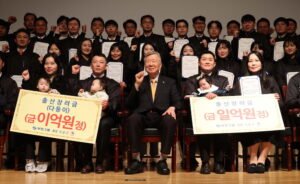A South Korean corporation is willing to spend millions of dollars to help solve the country’s appallingly low birth rate. Booyoung Group, a construction company located in Seoul, proposes to compensate employees 100 million Korean won ($75,000) for each child they have, according to a press statement issued Monday. The corporation will also provide a total of 7 billion Korean won ($5.25 million) in cash to employees who have given birth to 70 kids since 2021.
The Booyoung Group decision has stirred controversy, raising concerns about the effectiveness, ethics, and broader societal implications of rewarding parenting.
South Korea is now dealing with a population crisis. Its fertility rate, or the average number of children a woman has in her lifetime, is 0.81, far lower than the 2.1 replacement rate required for a stable population. This has sparked fears about a dwindling workforce, an aging population putting a strain on social security, and perhaps “national extinction” within 20 years, according to Booyoung CEO Lee Kun-Hee.
Company’s aim for South Korea’s future
Booyoung Group’s Chairman, Lee Joong-keun, stated that the firm is providing “direct financial support” to its employees to help alleviate the financial strain of raising children. Employees with three newborns would be given the option of getting 300 million Korean won ($225,000) in cash or renting houses if the government supplies land for building, he said at a corporate event on Monday.
“I hope we would get recognized as a company that contributes to encouraging births… and worries about the country’s future,” Lee said to his staff members.
The company’s baby bonus is intended to be a solution. “We are facing a national crisis. This incentive program is an act of patriotism, a way to contribute to solving the birth rate problem.” Lee said. Booyoung thinks that by providing considerable financial assistance, he may reduce the economic pressures that typically prevent young couples from having children.
Key Takes of Policy
This is the first time a South Korean corporation has provided such a significant fertility incentive in cash. While other countries have comparable rules, they are usually enforced at the national level. Employees may benefit greatly from financial assistance, particularly given South Korea’s high living expenditures. It may also motivate employees to stay with the firm longer, knowing they have this perk accessible.
Booyoung views the country’s dropping birth rate as a key issue, predicting “national extinction” in 20 years if the trend continues. They hope to encourage workers to have children and reduce the financial difficulties connected with raising them.
Such incentives may be discriminatory towards employees who choose not to have children. Furthermore, the impact of this program in increasing birth rates has to be established, as it just targets one of the numerous factors influencing family planning decisions.
History of this kind of Policy
The data highlights the demographic time bomb that South Korea and other East Asian countries are facing as their cultures rapidly age within a few decades after significant industrialization.
Many European countries are also dealing with ageing populations, although immigration slows and softens the impact of this transition. Countries such as South Korea, Japan, and China, on the other hand, have avoided substantial immigration to address the drop in working-age populations.
The South Korean government and some private corporations already provide financial incentives to encourage individuals to have more children, but none are on the magnitude of Booyoung Group’s rewards. Similar programs exist in China, where the population has declined over the past two years.
Last year, China’s Trip.com, one of the world’s largest online travel agencies, announced that employees who have been with the company for at least three years will receive an annual bonus of 10,000 yuan ($1,376) for each new-born child from their first birthday until they reach the age of five.










